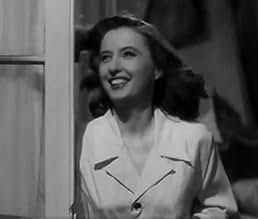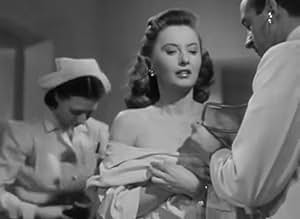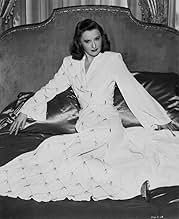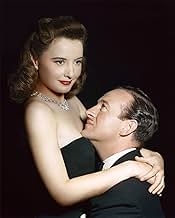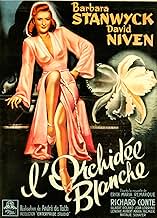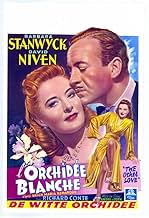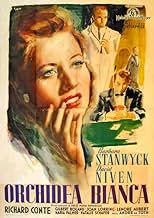Karen Duncan, a seriously ill concert pianist, enters a Swiss sanatorium where she's attracted to Dr. Tony Stanton. Ignoring his warnings about resting, she leaves for Monte Carlo with Paul ... Read allKaren Duncan, a seriously ill concert pianist, enters a Swiss sanatorium where she's attracted to Dr. Tony Stanton. Ignoring his warnings about resting, she leaves for Monte Carlo with Paul Clermont despite possibly fatal consequences.Karen Duncan, a seriously ill concert pianist, enters a Swiss sanatorium where she's attracted to Dr. Tony Stanton. Ignoring his warnings about resting, she leaves for Monte Carlo with Paul Clermont despite possibly fatal consequences.
- Director
- Writers
- Stars
- Restaurant Patron
- (uncredited)
- Casino Patron
- (uncredited)
- Casino Patron
- (uncredited)
- Roulette Player
- (uncredited)
- Casino Patron
- (uncredited)
- The Florist
- (uncredited)
- Townsman
- (uncredited)
- Woman
- (uncredited)
- Director
- Writers
- All cast & crew
- Production, box office & more at IMDbPro
Featured reviews
But Three Comrades had Frank Borzage directing it and that was the man for these films. His touch on bittersweet romances is as apparent and obvious as Alfred Hitchcock with suspense. This film would have raised a few notches in ratings had he directed it. And of course Sullavan would have aced the part of the tubercular heroine.
As it is Stanwyck is not bad in the role of a patient of Dr. David Niven at a Swiss sanitarium for tuberculosis. Niven is having a lot of trouble keeping his professional decorum with Stanwyck, but the doctor does win over the potential lover. Stanwyck doesn't realize how sick she is just as Sullavan didn't realize it in Three Comrades. She's a classical concert pianist and the enforced rest is rusting her technique.
The first chance she gets she runs off with racing driver Richard Conte who she doesn't tell how sick she is. But in the end Conte proves to be a stand-up guy.
There is also a very touching performance from Joan Lorring as a singer who is also a patient in the sanitarium. Her death just about pushes Stanwyck over the edge.
Barbara and the cast acquit themselves well, but Frank Borzage could have made The Other Love a classic.
Classical pianists and exclusive doctors were common themes in 1940s Hollywood but somehow in this film they don't jell. Academy Award winner (A Double Life), Miklos Rozsa's music score comes across well as a piece of heavy classical piano. Barbara Stanwyck displays a seldom seen ability as a pianist making it look very authentic. Niven by comparison is shown at the keyboard only once in an out of focus long shot and is obviously bluffing his way through. As for his doctor part, it is evident that he never seems happy in it. It is a rôle which Claude Rains had excelled at previously in "Now Voyager", here he could have played it to perfection so lifting the film out of its mediocrity. It's left to Stanwyck to carry the film.
Not one to rush to watch but interesting as a period piece and a chance to see two great stars of their time.
A torrid but never horrid romantic movie, what was called then a "woman's picture" and is now in the category of "chick flic." Which is what makes it worth watching right there--it's dripping with love and longing and ideals gone astray. It's set in a sanitarium the Swiss Alps and is grand as well as comforting. And it stars Barbara Stanwyck as a world famous pianist, and she pulls every scene up a notch. The men are less compelling: David Niven is necessarily dry and reserved (and no great contribution to the romance), and Richard Conte is supposed to be the Italian love idol but in fact he's dry and reserved, too, unnecessarily.
The plot is based on a short story by the uneven but legendary German writer Erich Maria Remarque (who is neither a woman nor French), whose work is the basis of several movies, notably the pacifist WWI novel, "All Quiet on the Western Front." I say all this because the one clear flaw in this movie is the plot, the Remarque part of it. In a way, the idea of going to a t.b. clinic to get better or die (the two options equally likely back then) and having an arrogant famous woman face her mortality, sounds like a no-brainer. And her back and forth, her rebellion, her falling in love (tepidly) or falling in lust (still rather tepidly) is great stuff not quite exploited. And there is no real turn of events. It plays itself out, beautifully but inexorably.
That is, this is a really warm, gorgeous movie, with photography by Victor Milner, who had just finished two cinematic masterpieces ("It's a Wonderful Life" and Stanwyck's previous film, "The Strange Love of Martha Ivers"). And the music is great (of course), led by Miklos Rozsa, an old world high romantic composer. You want to be there, and you relate to Stanwyck's dilemma. It's a great movie in its bones, but never quite getting off the ground. Yet it is about stuff that matters: acceptance and deception in the face of death, from several sides. And it is, in fact, about true love of some highly idealized, self-sacrificing kind.
From a medical point of view it does occur to me to wonder how many modern viewers will realise from the start what's supposed to be going on! The dread opening words 'Swiss sanitarium' are no longer a universally-recognised shorthand for the unnamed spectre of tuberculosis, the cancer equivalent for sentimental sagas of the era. But it is, of course, tuberculosis requiring all those chest X-rays, mountain air, and 'stimulating diet'...
The story is skilfully constructed along the lines of a murder-mystery, lulling the viewer into security for long stretches of time, arousing sympathy and indignacy at a regime that can deprive Karen of her music as well as her liberty and her mobility. Celestine's constant light malice on the subject of Dr Tony -- jealousy or realistic view? -- stirs up additional doubt, and her role turns out to have a much greater significance than we were led to believe. Questions of truth or lies run like a twisting theme throughout the greater part of the film, keeping the audience off-balance, and making Karen's ultimate reaction of discovery easier to comprehend. (Again, though, I do wonder if modern viewers will realise that in medicine of the period, deceiving patients for their own good was no misdemeanour but more or less expected!)
By and large, I found this film much more sophisticated than one might expect from a genre piece of this nature. I've already mentioned the elements that verge unexpectedly on horror amid the sweetness, and the innocent establishment beforehand of items that will later prove significant. Celestine is not what she may appear. And Clermont, too, is not the opportunistic cad first appearances might lead us to assume.
My main problem is that it seems to turn a corner into a quite different sort of film in the last few minutes, for no very convincing reason. Given its previous record in this line, I was anticipating some kind of apocalyptic revelation right up until the final shot... and was left still hanging there, waiting, when the film proved merely to have ended. It felt like a simplistic resolution to what had previously proved a complex structure. And, I think, it turns the story into one about the heroine learning her lesson rather than one about her fierce passion for life -- and thus, for me, making her a less appealing character. Despite everything, the cruise might have been the better option...
Did you know
- TriviaAlthough it is never stated in the film, Karen Duncan is suffering from tuberculosis (TB). One of the earlier treatments for TB was to place the patient in a healthy environment with continuous fresh air (often in a mountain or desert location), and to ensure that he/ she had a good diet and plenty of rest. This resulted in the establishment of many sanatoriums for TB patients (similar to the one run by Stanton) all over the world, .
- GoofsWhen Stanton gives Karen an X-ray, neither he nor the nurse stand behind any radiation protection. However, in the 1940s, X-rays were not yet considered dangerous, and this technology was widely used. Shoe stores even used X-rays to measure customers' feet through the 1950s.
- Quotes
Paul Clermont: Whither thou goest, so shall I!
Karen Duncan: That would be hard for both of us.
- Crazy creditsOpening credits prologue: SWITZERLAND
- Alternate versionsThere is an Italian edition of this film on DVD, distributed by DNA srl, "STELLA DALLAS (Amore sublime, 1937) + ORCHIDEA BIANCA (1947)" (2 Films on a single DVD), re-edited with the contribution of film historian Riccardo Cusin. This version is also available for streaming on some platforms.
- ConnectionsReferenced in Lolita (1997)
- SoundtracksÉtude No. 3, Un sospiro
Music by Franz Liszt
- How long is The Other Love?Powered by Alexa
Details
- Runtime
- 1h 35m(95 min)
- Color
- Aspect ratio
- 1.37 : 1

